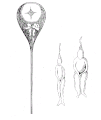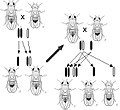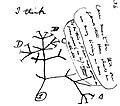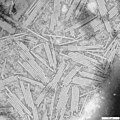Portal:Biology
Introduction
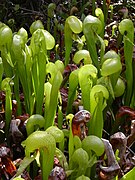

Biology is the scientific study of life. It is a natural science with a broad scope but has several unifying themes that tie it together as a single, coherent field. For instance, all organisms are made up of at least one cell that processes hereditary information encoded in genes, which can be transmitted to future generations. Another major theme is evolution, which explains the unity and diversity of life. Energy processing is also important to life as it allows organisms to move, grow, and reproduce. Finally, all organisms are able to regulate their own internal environments.
Biologists are able to study life at multiple levels of organization, from the molecular biology of a cell to the anatomy and physiology of plants and animals, and evolution of populations. Hence, there are multiple subdisciplines within biology, each defined by the nature of their research questions and the tools that they use. Like other scientists, biologists use the scientific method to make observations, pose questions, generate hypotheses, perform experiments, and form conclusions about the world around them.
Life on Earth, which emerged more than 3.7 billion years ago, is immensely diverse. Biologists have sought to study and classify the various forms of life, from prokaryotic organisms such as archaea and bacteria to eukaryotic organisms such as protists, fungi, plants, and animals. These various organisms contribute to the biodiversity of an ecosystem, where they play specialized roles in the cycling of nutrients and energy through their biophysical environment. (Full article...)
Selected article -
In evolutionary biology, function is the reason some object or process occurred in a system that evolved through natural selection. That reason is typically that it achieves some result, such as that chlorophyll helps to capture the energy of sunlight in photosynthesis. Hence, the organism that contains it is more likely to survive and reproduce, in other words the function increases the organism's fitness. A characteristic that assists in evolution is called an adaptation; other characteristics may be non-functional spandrels, though these in turn may later be co-opted by evolution to serve new functions.
In biology, function has been defined in many ways. In physiology, it is simply what an organ, tissue, cell or molecule does. (Full article...)
Selected picture -

Major topics
Selected biography -
James Dewey Watson (born April 6, 1928) is an American molecular biologist, geneticist, and zoologist. In 1953, he co-authored with Francis Crick the academic paper in Nature proposing the double helix structure of the DNA molecule. Watson, Crick and Maurice Wilkins were awarded the 1962 Nobel Prize in Physiology or Medicine "for their discoveries concerning the molecular structure of nucleic acids and its significance for information transfer in living material".
Watson earned degrees at the University of Chicago (BS, 1947) and Indiana University (PhD, 1950). Following a post-doctoral year at the University of Copenhagen with Herman Kalckar and Ole Maaløe, Watson worked at the University of Cambridge's Cavendish Laboratory in England, where he first met his future collaborator Francis Crick. From 1956 to 1976, Watson was on the faculty of the Harvard University Biology Department, promoting research in molecular biology. (Full article...)
General images -
Did you know -
- ... that endemics along the wildlife of Morocco include more than six hundred species of vascular plants and a single species of bird?
- ... that an extract of Alchemilla diademata, a plant endemic to Lebanon, shows antimicrobial activity against Staphylococcus aureus?
- ... that more than 5,000 hen fleas were recorded from the nest of a coal tit?
Things you can do
Related portals
Biology portals
Categories

Anatomy - Anthropology - Astrobiology - Biochemistry - Bioengineering - Bioinformatics - Biotechnology - Botany - Cell biology - Conservation biology - Developmental biology - Ecology - Environmental science - Evolutionary biology - Genetics - Mathematical biology - Medicine - Microbiology - Immunology - Molecular biology - Mycology - Neuroscience - Paleontology - Palynology Parasitology - Pharmacology -
Phylogenetics - Physiology - Systems biology - Taxonomy - Toxicology - Virology - ZoologyMore topics
WikiProjects

WikiProjects connected with biology:
A complete list of scientific WikiProjects can be found here. See also Wikispecies, a Wikimedia project dedicated to classification of biological species.
Associated Wikimedia
The following Wikimedia Foundation sister projects provide more on this subject:
-
Commons
Free media repository -
Wikibooks
Free textbooks and manuals -
Wikidata
Free knowledge base -
Wikinews
Free-content news -
Wikiquote
Collection of quotations -
Wikisource
Free-content library -
Wikiversity
Free learning tools -
Wiktionary
Dictionary and thesaurus









